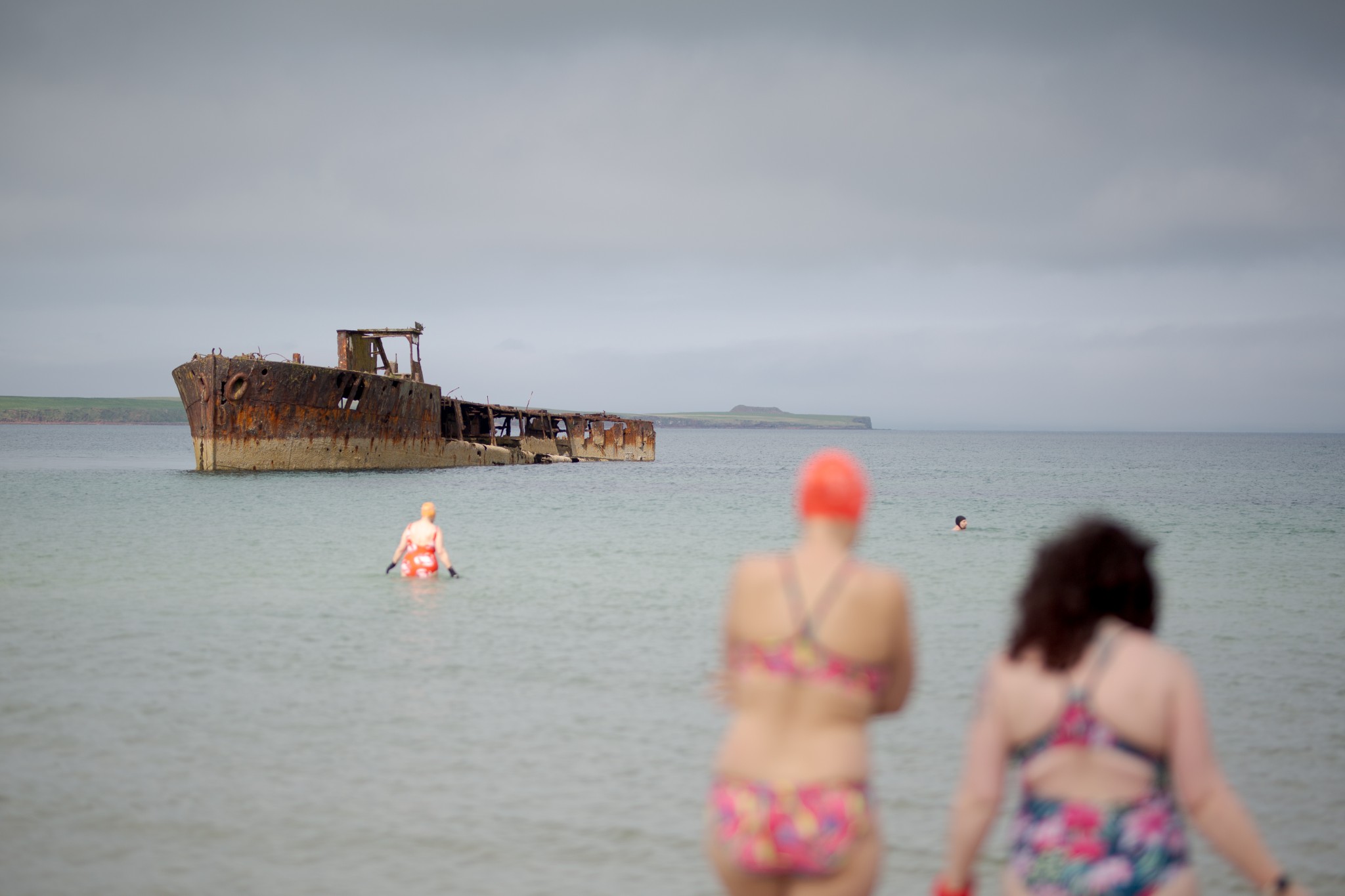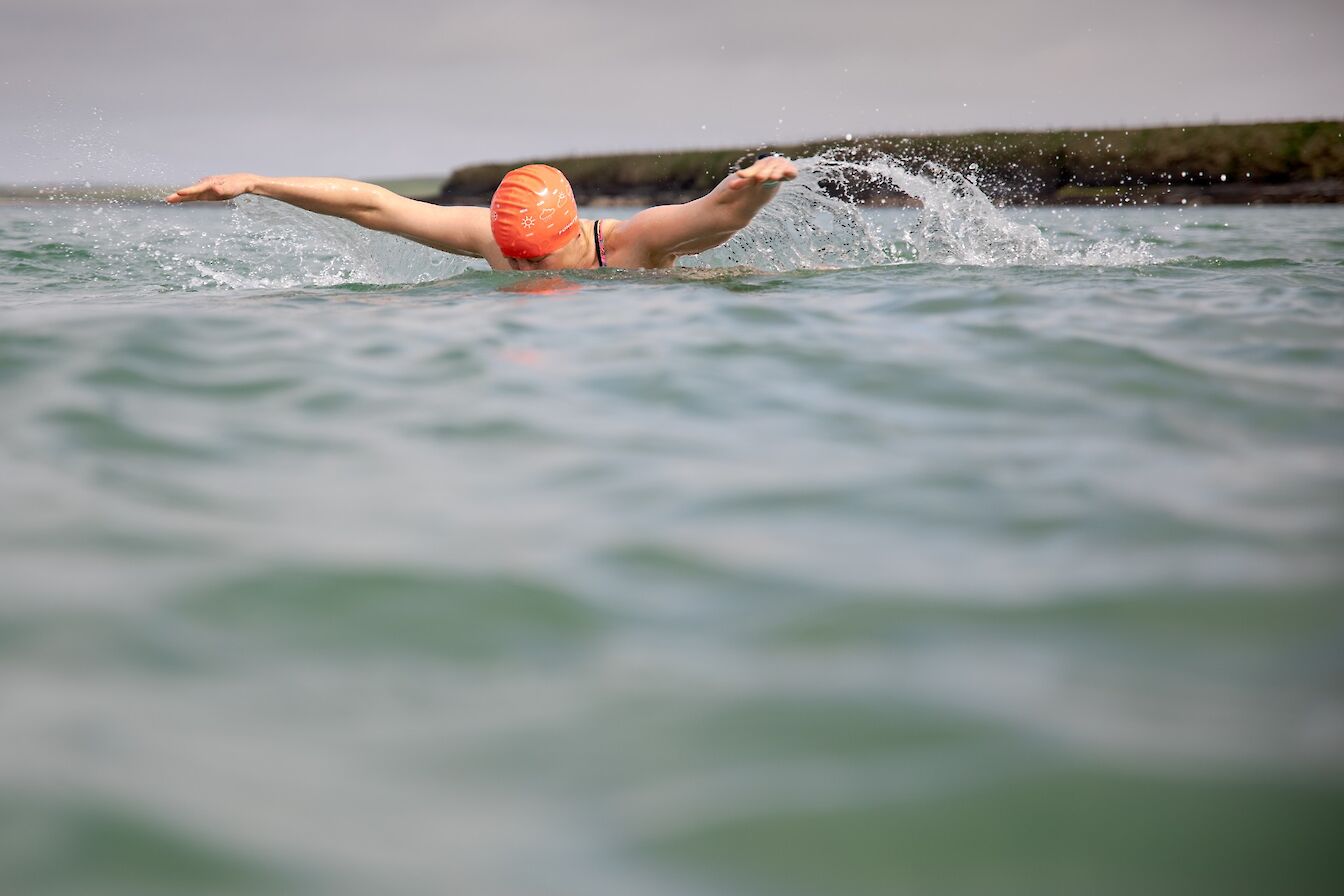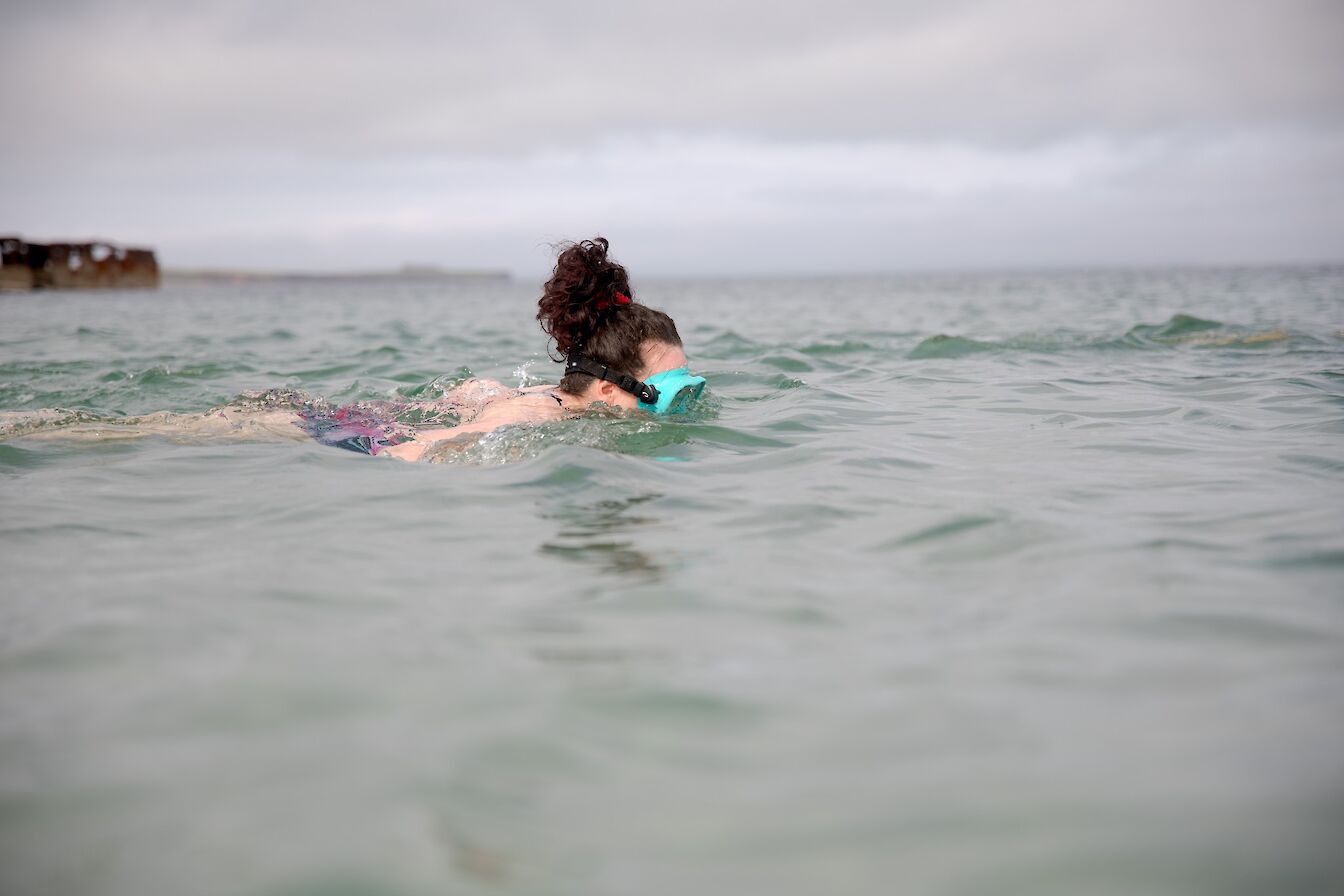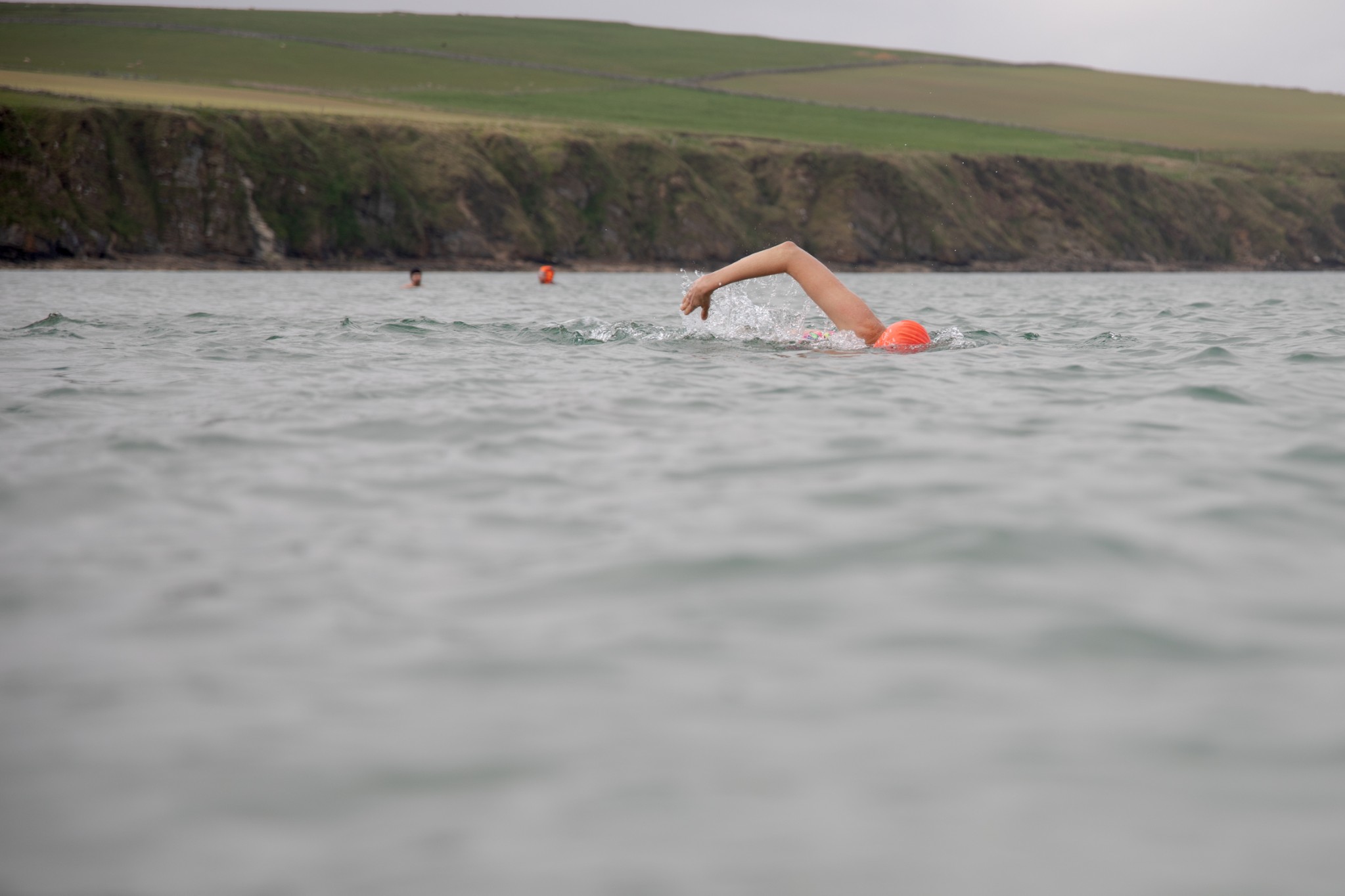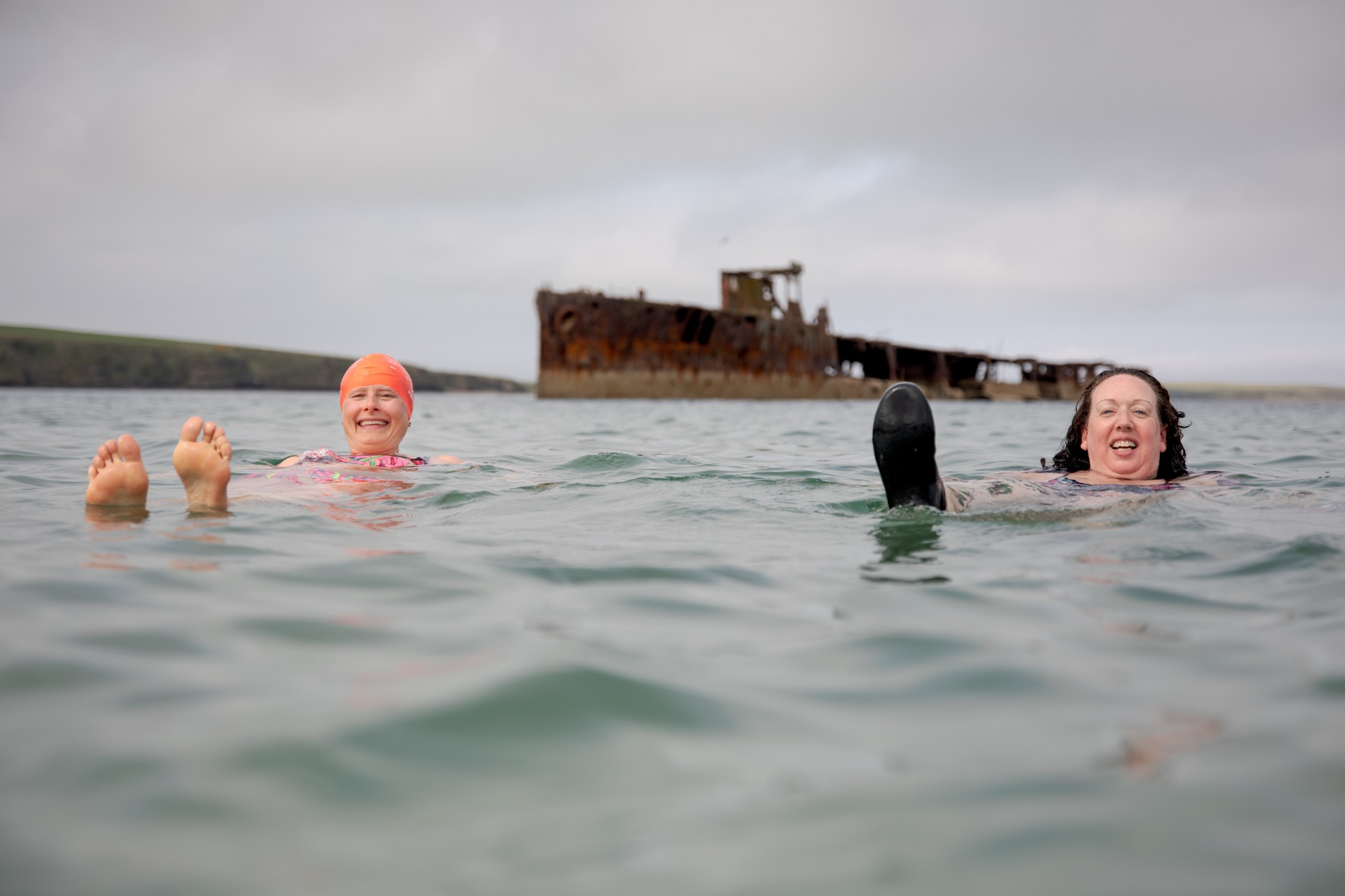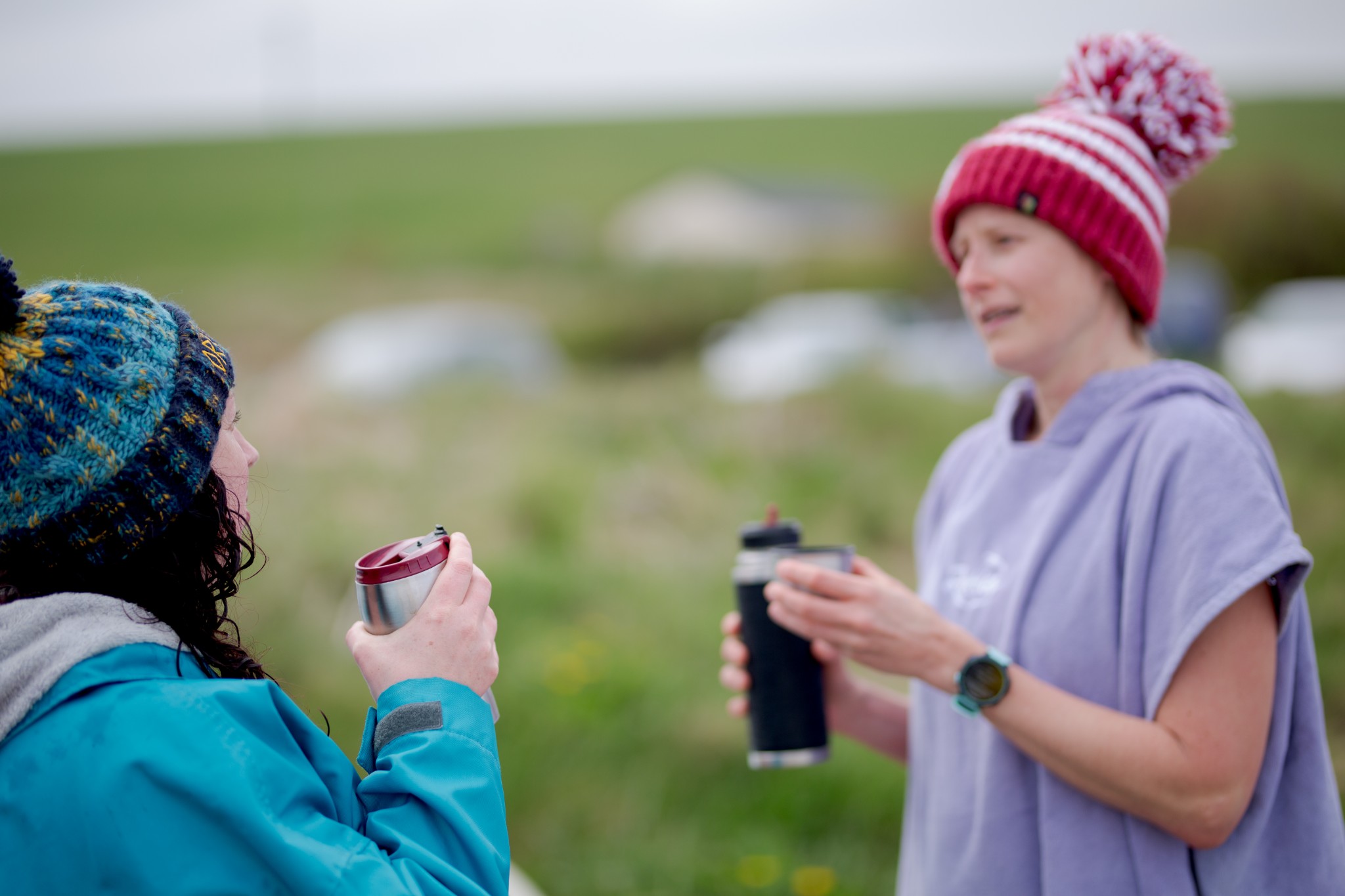It’s 7.00am on a spring morning at Inganess beach, just outside of Kirkwall. The sun’s out, but it’s still fairly low in the eastern sky given the time of year, and there’s a chilly edge to the light breeze cutting across the bay.
The water might be an inviting tropical blend of turquoise, blue and green, but its temperature hasn’t reached anywhere near double figures yet.
There are several vehicles in the car park, and a collection of rubber Crocs, flip-flops, training shoes and big black changing robes clustered on the sand, but there’s no sign of anyone on the beach.
And then you hear the laughter. It drifts back to land from the direction of the Junaita, the rusting wreck of a 105-year-old tanker that once served as a WWII blockship in the defence of Scapa Flow, but which now lies marooned and semi-submerged in the bay.
A group of women and men are bobbing in a circle halfway between the shore and the Junaita’s defiant, weathered bow, engaged in animated aquatic conversation Their heads and shoulders are clear of the water but occasionally they’ll dip their heads underneath, surfacing with a mixture of shock and delight.
Other swimmers in brightly coloured swim caps are slowly breast-stroking their way around the stern end of the wreck, fluorescent pink and orange tow floats following in their wake as they tick off the morning challenge – circumnavigate the Junaita before work.
And closer to shore, there’s a trio of women with their heads down, determinedly cutting through the water at speed, parallel to the beach, as if swimming lengths in a giant, slightly choppy public pool.
Outwardly, it seems there are some diverse goals being pursued here, from the quick dippers and chatting bobbers, to the silent distance enthusiasts still going strong with front crawl after 30 minutes.
Each group, though, is united by the purity of experience that is immersion in cold water. They all radiate the same palpable energy when emerging from the ocean, laughing, chattering and, it has to be said, shivering just a little.
Another common thread is the fact nobody is wearing a wetsuit while swimming. The onshore attire is also universal – thick changing robes, woolly hats, thermal tops and bottoms, hot water bottles stuffed inside fleeces, and big socks. Everyone has a flask of tea or coffee with them, too.
Folk have always swum in the sea around Orkney – the aptly named Polar Bears outdoor swimming club has been on the go here for many years - but it was the Covid-19 pandemic, and the lockdown enforced closure of local pools that sparked a huge rise in the activity throughout the islands.
People took to the water in their droves, some tentatively connecting with the marine environment for the very first time, others rekindling the childhood joy of just splashing around in the sea without a care. For serious swimmers, deprived of the opportunity to train hard indoors, the ocean (and some of our lochs) proved to be the ideal place to maintain fitness, while reaping bonus elements of physical and mental resilience.
“I started when a friend asked me to come along for a mid-summer midnight swim in June 2020 after going through a lot of stress and grief at the beginning of the Covid-19 pandemic,” says 42-year-old Susan Mackay, a lecturer and business owner from Kirkwall. “She gave me a wetsuit to try, and I was hooked as soon as I started swimming. I felt all the weight on my shoulders lift and felt so much clarity. It was actually quite emotional. I used the wetsuit for a couple of weeks but moved to a swimsuit to make getting in the water more often much easier.
“Sea swimming for me is all about my mental health and general wellbeing,” continues Susan, who tries to get into the ocean at least two or three times a week either at Inganess or Waulkmill. “I can’t express enough how much sea swimming means to me, the confidence it has given me and how much it reduces the stress of a busy life is noticeable every time I get in the water. I also love the swimming community here as there is so much support and no requirement to be a certain size or have the most expensive kit. It’s all about having fun and looking out for each other.”
For another Inganess regular, Alison Lievesley, the pandemic pool closures meant her training regime for a planned Pentland Firth swim in 2020 – she’d already tackled the English Channel in 2009 – was all conducted outdoors in Orkney, an experience she describes as “brutal”.
“I don’t think I was warm for four months,” she laughs. “Now I’m back to enjoying my time in the water rather than pushing myself to extremes, and for now, that’s rather more fun.”
Alison, a doctor based in Evie, swam the Firth’s 6.3 miles in three hours and 29 minutes (by contrast, her 21-mile English Channel swim took 13 hours and 14 minutes). She’s still not decided which was tougher.
But regardless of whether you’re planning to swim the Pentland Firth and English Channel, or just looking to boost your wellbeing with a quick morning dip in the sea, everyone has to take that same first step.
“Everything felt cold when I started!” recalls Alison, who took up UK open water swimming around 2005, when halfway through her medical studies. “Initially, I liked the buzz, the slight euphoria of feeling like you'd done something that morning not many other people had done, especially in winter. I also liked the all-age, all-ability camaraderie, the support if you decided you were going to do a long swim, and the times we just met and played in water.”
She adds: “I don't know how to explain the bliss of swimming in cool, or cold, water, especially if it's flowing in the same direction you want to go! It's definitely good for general well-being, both from a social and a getting outside/exercise point of view. For me there are seasons of big effort and seasons of being comparatively lazy - I simply don't have the stamina or the desire to keep going at high intensity forever!”
Susan similarly likes to mix things up.
“When I started sea swimming, I was all about getting in distances which was supported by doing the winter Polar Bear and Penguin challenges,” she reflects. However, it’s now all about getting as much time to see under the water as possible. Sometimes I love a fast swim across Inganess Bay to release any stress and feel strong, but other times I just like to explore.”
Crucially, for anyone keen to get involved in a pursuit which can be daunting and not without its risks, the car park atmosphere at Inganess is always warm and welcoming. They’ll advise you on how to start and what to do to stay safe.
“Find a group who know the local conditions, and don't swim alone,” says Alison. “There are loads of people swimming at the moment, and no need to take risks.
“Always get out before you get cold - don't stay in because someone else has done - we're all different, and cope differently with the cold. And if you're starting to feel warm, definitely get out - you've been in too long.
“Finally - warm layers! Have them ready in the order you'll put them on for when you get out of the water. You carry on getting cold after you get out, so it's important to get dry and dressed and warm quickly - get a hat on and get a hot drink into you.”
Susan echoes Alison’s advice.
“Always have a buddy to make sure you stay safe in the sea,” she says. “Go in gentle and slowly to acclimatise yourself, and don’t push your limits. There is no need for expensive kit at all - a swimsuit is all you need - but make sure you have plenty of layers and warm clothes to warm up when you get out the sea.”
She adds: “If you’ve ever thought about sea swimming, or heard about the many benefits, then get in touch with any of local sea swimming groups and ask to come along. There’s usually someone able and willing to go out with you.”
You only have to look at the faces of the Inganess swimmers as they chat, post swim, to know they’ve all tapped into something hugely powerful, positive and completely free into the bargain.
Remember, the seas around Orkney are potentially dangerous, with low temperatures even in summer and many areas subject to strong currents/waves. If you’re keen to swim in Orkney’s seas or lochs, please ensure you go with a group, and follow local advice on safe swimming spots/tides.
